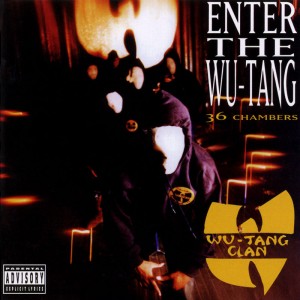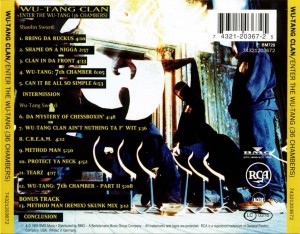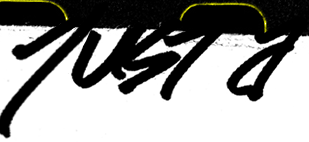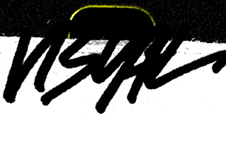 We all know that rap intros are pointless and long-winded so let me get right to it; The Wu-Tang Clan from 1992-1997 is the greatest musical thing to ever exist. As a tribute to this dynasty of musicology, I will be reviewing the first seven releases from the clan; their first two group albums, plus the first five solo albums. Let us begin with the most important hip-hop album to ever be released; Enter The Wu-Tang (36 Chambers).
We all know that rap intros are pointless and long-winded so let me get right to it; The Wu-Tang Clan from 1992-1997 is the greatest musical thing to ever exist. As a tribute to this dynasty of musicology, I will be reviewing the first seven releases from the clan; their first two group albums, plus the first five solo albums. Let us begin with the most important hip-hop album to ever be released; Enter The Wu-Tang (36 Chambers).
36 Chambers starts off like no other hip-hop album before it; with a startling kung-fu movie sample directly into Bring Tha Ruckus, the first of another dozen lethal cuts. Now, I’m no hip hop genius, but near as I can tell, the instrumental style on this album was, much like Jesus, a child with no father; being birthed purely from the cosmic aether and the weed-drenched mind of Prince Rakeem aka The Ruler Zig-Zag-Zig Allah aka The Scientist aka Abbott aka Rzarector aka RZA Razor Sharp. Who, by the way, is the best hip-hop producer to ever live, as well as the finest actor of our generation. The instrumentals are dirty, dark, tough as nails, and feature bizarre nondescript noises that often make me contemplate whether the Rizz listened to power electronics like Whitehouse prior to taking his seat behind the boards. Whatever his inspiration for these random noises was, the combination of those with his low-rent 8O8 machine, choice piano loops (often played by himself), and the occasional soul sample created a watershed moment in hip-hop. Basically every hip-hop album coming out of New York from 94-99 bears hints of RZA’s signature style, but look no further than Kanye West’s early production work and it’s dominance of the rap game, across the entire nation, to see a direct line from early Wu to popular music at large.
But as dark and hardcore as his style sounds, it was also fun! As perfectly exemplified on track number two; Shame On A Nigga. Bouncing horns and an almost carnival-music like zaniness to the overall production of this track is basically the only way that anyone should ever be introduced to the most… the most… just the most Wu-Tang member of the Wu-Tang Clan; Ol’ Dirty Bastard. Filthy and scattered; his style was loco. The man could croon unintelligible gibberish with such soul and then drop the most hilarious and excessively un-PC lines imaginable at the drop of a hat. I never heard an ODB moment that wasn’t perfect. I’ll get back to Dirt McGirt later.
Track three takes things into a different direction. Here we have a solo cut by The Genius aka The GZA, whose name implies a level of seriousness that was just as essential to the Wu as ODB’s leadership in the comedy department. Clan In Da Front highlights the lyricism of the group, which is often overlooked when you have crazy production choices like kung-fu chops and pitch-shifted soul samples. And while The Genius’s style is highly commendable and deserving of a track all to his own, what makes the clan shine shine shine is the fact that there are 9 members who are all delivering their own particular brand of lyrics + flow. Which is where tracks like Wu-Tang: 7th Chamber come into play; seven members show off their skills, one after another, with no chorus.
Raekwon starts things off with his street-wise (even moreso than the others) style that focuses on hardcore criminology and inventive slang while Method Man follows him using his smooth, meandering flow and charismatic wit. Then, out of the shadows, comes my favorite member of the clan; Inspectah Deck. As Meth later comments on this album; Deck is the kind of guy who’ll calmly sit back and observe what’s going on around him and then hop up out of nowhere and “take you to court” – never the frontpiece, always the surprise hit. Deck’s verse’s on this album don’t have the trendsetting style of Ghostface and Raekwon or the charisma of Method Man or ODB, but what they do have is a clockwork composition and genuine intensity. Plus some sick internal rhymes and timing-shifts straight out of a math-rock album. During the Wu’s golden years, Deck was the underrated member who rocked every guest spot on the block. Much like ODB, I am NOT done pontificating about this gentleman.
I have to admit that until recently, I never fully appreciated Ghostface Killah’s style. The man was a pioneer of the NYC’s crime-oriented hip-hop, but unlike many who fell into the traps of sub-genres focusing on being a gangsta or getting too thugged out, Ghost spoke of illegal activity and street life with a much more pure and meaningful attitude – this is where I come from, this is what I’ve done, but I don’t glorify it, and I don’t encourage it. Couple that with his sick penchant for connecting completely unrelated things that happen to rhyme, and you’ve got a class A rapper. Unfortunately, I have to get real for a second when I say that RZA, as a rapper, is definitely a step down from the front runners of the Wu (maybe class A-?). He has a definite skill with choosing words and assembling them into a good order to be delivered, but the problem is, he is not a fantastic performer. His verses are usually delivered in a forced or awkward manner and he too often relies on short periods between simple rhymes and no matter how expensive the words get, that aspect reeks of an underdeveloped artist.
But real quick; let’s talk about the “killer tape” skit, that starts off 7th Chamber. I’m normally not a fan of skits on hip hop albums, but Wu-Tang figured out how to do it well. This little ditty starts off with Raekwon harassing an obviously inebriated Method Man about a copy of the movie The Killer which he has lent him and wants returned. The two are soon interrupted by Ghostface and U-God who share that an associate has just been shot in the head. Between U-God deadpanning “is he is he is he dead?” and Ghostface referring to everyone and everything as “God” (Yo God, what’s up God? It’s the God, God, word is bond); the whole exchange starts off as bizarre, inane, gibberish, but after a few listens it starts to come across as the MASH of the ‘hood. I feel like uninitiated suburban kids get an even better experience from this than those “in the know” as more (possibly unintentional) layers of comedy stem from that ignorance. Pulling high-risk shit like this, and succeeding, is why this album is so ludicrous and successful.
Following 7th Chamber (which concludes with ODB & GZA verses that continue the path the two tread on their earlier tracks), the album takes a big turn with both positive and negative effects. Here we have the track Can It Be All So Simple; a subdued and wistful track about the highs and lows of trying to live the dream of a drug-dealer turned rapper. Both Raekwon and Ghostface deliver tight, vivid verses that make you understand their longings for the good life and regrets about some of the decisions they’ve made. However, this sledgehammer of a track has always failed to make me FEEL what they are talking about. Perhaps it is just too ham-handed to shine. The idea and the beat are great; it’s just the overall sum of it’s parts falls short. Later, the two decided to bust a remix out on Raekwon’s Only Built For Cuban Linx… I wonder how that went….
At this point the astute listener might be asking himself “I thought there were NINE members of The Wu-Tang Clan? Why have I only experienced SEVEN different styles?” Well, Da Mystery Of Chessboxin’ will quickly solve that with a lead-off verse by U-God (his only full verse on the album) that comes at a startling contrast to the other members. Baby U’s deep, resonant vocals and relaxed style are an excellent counterpoint to all the hyped-up, nasal passages recited by the other members (see: Deck’s slamming verse which hits immediately following U-God). If someone were to judge U-God based purely only this appearance alone, that person would probably think he was A) a really good rapper and B) a “psychopathic thinker” as Method Man puts it. Unfortunately (or fortunately?), U-God was incarcerated for most of the recording of 36 Chambers so he barely made it onto the record and he walks away looking like a king. Closing out this track is U’s partner in anonymity; Masta Killa. By far the most mysterious member of the clan, Killa makes one appearance on this record and it’s fucking awesome. Killa was mad young when this record happened and apparently had never rapped before; he was just friends with the clan. The story goes that Cappadonna and Killa were vying for the same appearance on the LP and while Donna fell asleep that night, Killa stayed up all night writing his verse. When the morning came, he slayed Cappachino and solidified his place in the clan. His flow is on point, his delivery precise, and his lyrics are tight and well-thought out; a true Mastah Killa, indeed. As Killa grows up, his style becomes more and more of a dynamic and individualistic approach, and it’s beautiful to experience, but for now he’s just HUNGRY as shit and it comes through in his single grand slam to close off this track.
And so it goes for the majority of the rest of the album. The listener is assaulted from all angles by various takes on the central theme of the clan; a bizarre hybrid of comic books, kung-fu flicks, street life, and themes from The Nation of Islam. Wu Tang Clan Ain’t Nuthin’ Ta Fuck With and Protect Ya Neck are two of the best tracks on this album, following the pattern of Chessboxin’ and 7th Chamber, while Method Man is a more lighthearted and comedic solo joint from Johnny Blaze himself (that’s Method Man… in case you are braindead). Tearz is another melancholy track in the vein of Can It Be All So Simple, and much the same, I find it to be sub-par, but in this instance, it’s even less on par. The verses are just not great and the overall production and instrumentation is weak. I definitely consider this to be the worst track on the album. However, the clan does find their sweet spot in the “more emotional track” department with the best hip hop song ever recorded, CREAM. Paragraph break!
CREAM is an insanely good jam composed of one of the simplest beats/samples in the history of hip hop (The Charmel’s As Long As I’ve Got You written by Isaac Hayes and David Porter), but it has been manipulated to perfection by The RZA. Two tiny moments in the aforementioned soul standard have been chosen beautifully (one for the intro, the other for the entirety of the rest of the song) and looping the latter creates an entirely different musical creature. Unlike a lot of samples in hip hop that just take a song’s major verse or chorus and run with it, plucking this one tiny feather births an entirely different bird. And then you can add Method Man’s insanely catchy chorus, which gives flight to the best slang terminology that hip hop ever created; Cash Rules Everything Around Me. Beyond the simple interpretation of “I don’t give a fuck about anything except money”, the phrase minimizes and simplifies the concept of “in the world that I live in, money is the most important thing because it controls your standard of living and freedom and while all I want to do is be free and happy and live without worry, I’ve got to play the game and take whatever I can to survive”. Whether you’re slinging crack in the ghetto or roofing in the suburbs, you can relate to that concept. Plus it sounds cool. Oh, and then Raekwon and Inspectah Deck deliver two of the best verses on the record.

Raekwon apparently sat on this beat for years, having his heart set on rhyming over it, knowing it was gonna be gold. While it certainly shows, and all apologies to The Chef, my man Deck kills it here. This verse charts the entirety of a thousand other rapper’s careers (starting from nothing, getting involved in illegal activities to get ahead, trying to escape that life, and then returning to teach the next generation about a better path) through Deck’s compositional standards; detailed internal rhyme schemes, a tight “blast out of the gate” intro, unrelenting mid-section with on-point flow and smooth, not simple, rhymes, and a beautiful, philosophical, melancholy, while still hard closing. My own, and many other’s, favorite/greatest hip-hop song, ever.
Peace to all the Gods; we out.





